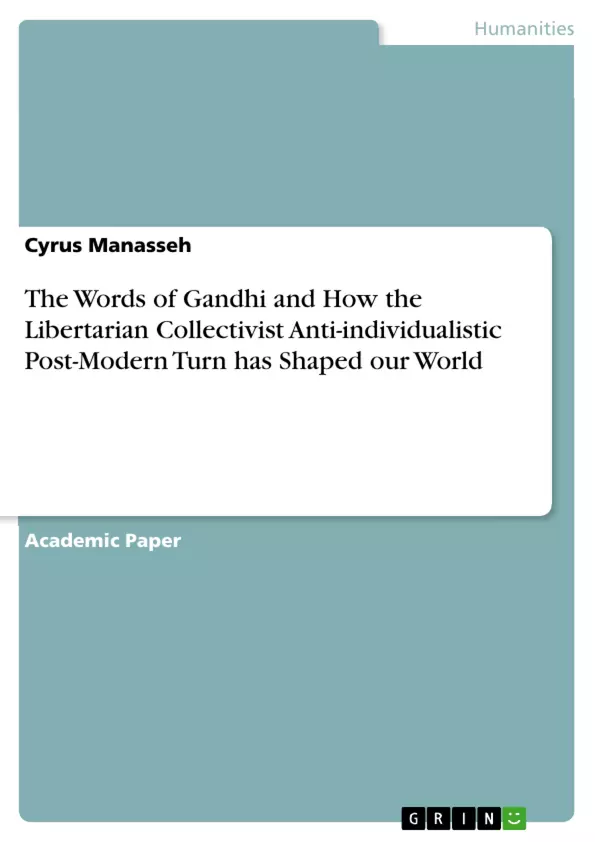The social effects of a “Libertarian” anti-individualistic post-modernism for us today, are meaningful and significant. Perhaps, many of us have heard about post-modernism? And some can say that we have read about it. But how many really know how much post-modernism has influenced every single thing we now do and think? Making special reference to Jordan Peterson's critiques as well as Socrates and The Enlightenment period and the internet, the essay discusses and evaluates the good and bad side effects of post-modernism and addresses how we might learn from understanding them. This academic essay was part of previous research undertaken when I was lecturing at the University of Western Australia where I had also achieved my PhD. In 2015 I left it unpublished and have subsequently amended and updated it.
Inhaltsverzeichnis (Table of Contents)
- Good vs bad side effects and how we can learn from understanding them
- The problem with the definition of the individual and individualism: left wing ideology-libertarian ideas – from the French Revolution
- Down with hierarchy, meta narratives and an era of protest
- The Internet
- The 1990s and the death of the grand narratives / meta-narratives and the transgression of all boundaries and categories.
- The 2000s, the digital dream and the age of alter-modernism…...... (digital was supposed to be different - it was supposed to be inventing the world) ...
- A solution? What can we do?
Zielsetzung und Themenschwerpunkte (Objectives and Key Themes)
This essay explores the influence of "Libertarian" anti-individualistic postmodernism on our current social landscape, examining both its positive and negative effects. The author discusses the origins of this movement, tracing its roots to the 1960s and the critique of traditional hierarchies and grand narratives. The essay then explores how postmodernist ideas have impacted various aspects of our lives, including art, culture, and technology.
- The rise and impact of "Libertarian" anti-individualistic postmodernism
- The critique of traditional hierarchies and grand narratives
- The influence of postmodernism on art, culture, and technology
- The role of the internet in shaping contemporary society
- The potential for solutions and alternative approaches to postmodernism
Zusammenfassung der Kapitel (Chapter Summaries)
- Good vs bad side effects and how we can learn from understanding them. This chapter introduces the concept of "Libertarian" anti-individualistic postmodernism and its significance in shaping our contemporary world. It highlights the need to understand the movement's influence on our thoughts and actions.
- The problem with the definition of the individual and individualism: left wing ideology-libertarian ideas – from the French Revolution. This chapter traces the origins of the movement back to the 1960s, emphasizing its roots in leftist ideology and its critique of traditional individualistic values. It discusses the influence of key thinkers like Michel Foucault, Francois Lyotard, and Jacques Derrida.
- Down with hierarchy, meta narratives and an era of protest. This chapter delves into the postmodern rejection of hierarchical structures and grand narratives, linking it to the broader cultural shifts of the 1960s and 1970s. It explores the rise of artistic movements that challenged traditional forms of art and representation.
Schlüsselwörter (Keywords)
Key terms and concepts explored in this essay include "Libertarian" anti-individualistic postmodernism, hierarchy, grand narratives, French Revolution, Michel Foucault, Francois Lyotard, Jacques Derrida, the internet, digital culture, and the Enlightenment. These themes underscore the essay's focus on examining the impact of postmodern thought on contemporary society and culture.
Frequently Asked Questions
What is "Libertarian" anti-individualistic postmodernism?
It refers to a postmodern ideological shift that critiques traditional hierarchies and grand narratives while reshaping the modern definition of the individual.
Which thinkers are central to this postmodern critique?
The essay discusses key figures like Michel Foucault, Jean-François Lyotard, and Jacques Derrida.
How has the internet shaped postmodern society?
The internet is analyzed as a tool that facilitates the digital dream of reinventing the world but also contributes to the death of grand narratives.
What is Jordan Peterson's role in this discussion?
The essay incorporates Jordan Peterson's critiques of postmodernism and its impact on contemporary values and hierarchies.
What are the "bad side effects" of postmodernism mentioned?
They include the transgression of all boundaries and categories, which can lead to social fragmentation and an era of perpetual protest.
- Quote paper
- Cyrus Manasseh (Author), 2015, The Words of Gandhi and How the Libertarian Collectivist Anti-individualistic Post-Modern Turn has Shaped our World, Munich, GRIN Verlag, https://www.grin.com/document/591114



